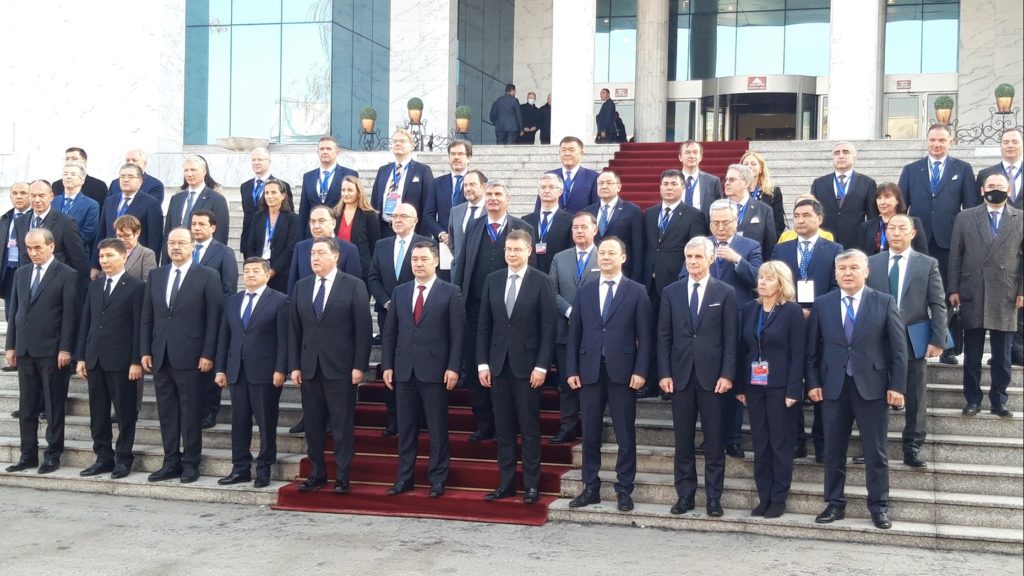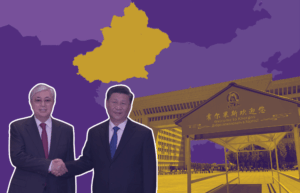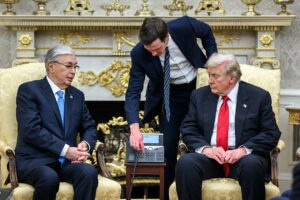The first economic forum between the European Union and Central Asia was held on November 5 in Bishkek, the capital of Kyrgyzstan. An opportunity for constructive exchanges, but also to confirm or repeat declarations of intent on bilateral projects between Central Asian and European states. This article was originally published on Novastan’s French website on 15 November 2021. On 5 November, the president of Kyrgyzstan Sadyr Japarov opened the first economic forum between the European Union (EU) and Central Asia in Bishkek. The Kyrgyz president celebrated “a new step towards further cooperation between the European Union and Central Asia, which allows for legitimate optimism,” reports the Kyrgyz news agency 24.kg.
Sadyr Japarov underlined the symbolic aspect of this first economic forum, 30 years after the independence of Central Asian republics. He acknowledged the ongoing partnership process of the European Union, which “supported democratic changes and changes of the market.” The idea behind this economic forum between the EU and Central Asian countries was launched in December 2020 in order to support a green and resilient revival after the socio-economic crisis, caused by the Covid-19 pandemic, declares the EU. It aims to quicken the pursuit of diversity in Central Asian economies, to stimulate trade, to strengthen the rule of law and to modernize the regulatory framework. Before the summit, the European Union estimated that the forum would serve as a platform for dialogue between and towards regions, which will help to translate into concrete actions goals of the European Union strategy for Central Asia. This strategy was presented in May 2019. The green relaunch, digitalization, and the Central Asian business climate The result of this forum was primarily the declarations of intent. The joint press statement by the EU and the five countries of the region can be summarized as the acknowledgment of some issues and the reiteration of wishes, without figured agreements and concrete promises. Covered topics include the environment from an economic perspective with the green relaunch. Thus, Kyrgyz prime minister Akylbek Japarov reiterated that Central Asia is deeply impacted by the melting of glaciers and the shortage of some resources, describes 24.kg. Three weeks after he came into office, Akylbek Japarov however took an optimistic view, estimating “factors which favour both green revival and the overall building of a green economy” existed in Kyrgyzstan. Beyond Kyrgyz declarations, all representatives of Central Asian republics expressed their will to expand the Euro-Central Asian cooperation. Representatives of both parties stressed the importance of the forum for the economic development of the region, describes Kyrgyz media Kabar.kg. The president of the European Commission, Ursula von der Leyen, also participated in this forum. In a video conference, she emphasized the fact that the green relaunch, digitalization and the strengthening of the business climate were domains upon which “Europe has unprecedented expertise”. Hungary dives in Kyrgyzstan in particular However, also some more concrete points have been tackled during the forum. Thus, Austria was able to express its interest in the building of a hydroelectric power station in Kyrgyzstan during an interview between Sadyr Japarov and the Austrian Minister of Foreign Affairs, Michael Linhart, says 24.kg. Hungary is one of the European countries which offered the most concrete elements at the forum. Budapest indeed has announced its recognition of vaccination passports of Kyrgyz citizens, says 24.kg. Furthermore, direct flights from Budapest to Bishkek will be available in 2022. At large, the Hungarian minister for Foreign Affairs Peter Siyjarto and the Kyrgyz Minister of Economy Daniyar Amangeldiev have officially launched a Kyrgyz-Hungarian fund for development worth 16 million dollars (14 million euros), reports Kabar.kg. The fund is aimed at helping Kyrgyz small and medium size businesses. Reinforced by the success of this first edition, this forum is to be organized yearly, says Kabar.kg. Set for 2022, the second session will take place in the Kazakh capital Nur-Sultan, after the evaluation of the outcomes of the work carried out in Bishkek.
Written by Leo Friedrich
Translated from French by Emma Bekrine
Edited by Maya Ivanova
For more news and analysis from Central Asia, follow us on Twitter, Facebook, Telegram, Linkedin or Instagram.
 The EU held its first economic forum with Central Asia
The EU held its first economic forum with Central Asia 



